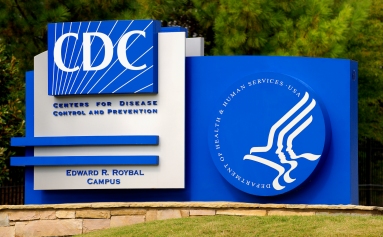Center for Law, Health & Society | News and Events | Center News | 2012 Archive | Types of Work at CDC Types of Work at CDC
Office of the General Counsel
The CDC Branch in Atlanta of the Office of the General Counsel (OGC) for the Department of Health & Human Services reflects the most traditional legal practice setting for law school graduates at CDC.
 "I provide in-house legal advice and counsel to CDC management and staff on a wide range of public health, environmental, administrative, operations, and litigation matters," said Mark Kashdan, JD '99, a Senior Attorney with the OGC.
"I provide in-house legal advice and counsel to CDC management and staff on a wide range of public health, environmental, administrative, operations, and litigation matters," said Mark Kashdan, JD '99, a Senior Attorney with the OGC.
Much of Kashdan's recent work has been litigation-related, and he often works closely with attorneys in the U.S. Department of Justice on environmental, tort, and criminal litigation matters. He has worked on several high-profile cases, including the Deepwater Horizon multi-district litigation filed over the Gulf Oil spill, the Omnibus Autism Proceeding in the U.S. Court of Federal Claims (involving thousands of claims alleging vaccine-related autism), the World Trade Center litigation over personal injury claims by workers responding to the 9/11 disaster, and civil enforcement and criminal litigation related to the Libby Asbestos site in Montana - possibly the worst Superfund toxic waste site in terms of illness and death of workers and residents around the site.
Sudevi Navalkar Ghosh, JD '98, is another Senior Attorney in the OGC. "I provide legal counsel to various programs within the CDC," she said. "I like that there is a lot of diversity in our work and a need to understand the underlying programmatic work of our clients." Ghosh's clients include the National Center on Birth Defects and Developmental Disabilities; the Office of the Associate Director for Science; the Office of Surveillance, Epidemiology, and Laboratory Science; and the Center for Global Health's Global AIDS Program. Recently Ghosh has also been involved with healthcare reform implementation.
Public Health Law Program
Established in 2000, the Public Health Law Program (PHLP) in the Office for State, Tribe, Local, and Territorial Support is a relative newcomer among programs at CDC. Awareness is growing that laws and regulations can positively improve the public's health - for example, they have played key roles in such public health achievements as controlling and preventing the spread of infectious diseases, increasing childhood immunizations, and promoting the workplace and motor vehicle safety.
"Although we are still in the early stages of understanding the incredible impact that laws and regulations can make on public health outcomes," said Donald Benken, JD '97, Senior Public Health Advisor with the PHLP, "as we continue to analyze population health from both science and law perspectives, we will be able significantly to improve our nation's health and reduce health care costs." Benken provides technical assistance to health departments and their legal counsel across the country about laws, regulations, and policies that impact the public's health. He is involved with developing strategies to strengthen legislative language in public health laws, as well as developing legal tools that state and local agencies can use on issues ranging from preparedness to respond to public health emergencies to improving programs related to chronic disease prevention.
 Law school graduates with the PHLP utilize typical legal skills, often in research and policy settings. "I need knowledge of the law and legal research skills," said Lindsay Culp, JD '10, a Public Health Analyst with the program. Among other things, Culp is the editor of the CDC Public Health Law News, which has a global circulation.
Law school graduates with the PHLP utilize typical legal skills, often in research and policy settings. "I need knowledge of the law and legal research skills," said Lindsay Culp, JD '10, a Public Health Analyst with the program. Among other things, Culp is the editor of the CDC Public Health Law News, which has a global circulation.
Given the breadth of public health law work at the PHLP, Culp laments that "I wish I could have fit more courses into my schedule while in law school, like administrative law, local government law, and other public health law courses."
The law graduates in the PHLP are not giving legal advice - that role is reserved for the lawyers in the OGC - yet they are heavily engaged in law-related work. "While all of my work is related to law, none of my work is legal advice," said Stacie Kershner, JD '08, an ORISE Fellow with the PHLP. Kershner works on various projects related to determining the potential impact of laws on the public's health, such as whether laws related to carbon monoxide alarms are preventing deaths and how understanding laws related to emergency preparedness can be critical to a successful future response to a public health emergency. "I started at the CDC on the first day that the H1N1 flu was announced in the United States," she said.
Lisa Caucci, JD '10, is the Georgia State graduate most recently hired in the PHLP, having started in August 2011. "I love the breadth of topics encompassed by my work," said Caucci, who has already been working on preemption issues, proper research methods in health law, the potential impact of healthcare reform measures on public health departments, and privacy safeguards related to the use of social security numbers. "It's so rewarding to know that the work we do plays a part in improving the public health system."
Law-Related Work
Gail Horlick, JD '90, is a Senior Analyst in the Office of Scientific Integrity. Much of her work involves protecting individuals' privacy and confidentiality of their health data, thereby maintaining the public's trust. She analyzes the impact of federal legislation (such as HIPAA and FERPA) on public health practice and research.
"I respond to approximately 100 inquiries every year about legislation, data sharing, and policy development, as well as provide training on privacy issues across CDC programs," Horlick said. "As a member of the CDC Public Health Ethics Committee, I provide input on ethical considerations related to restrictions on travelers with communicable diseases." One year she testified before a subcommittee of the National Committee on Vital Health and Statistics on the impact of federal privacy law on school entry for children.
Rebecca Polinsky, JD '07, Research and Practice Fellow, currently works on a joint project with the Healthy Aging Program and the Public Health Law Program. The project will produce a preparedness guide and web portal for legal and practical options and strategies for state and local entities to use in planning for and protecting vulnerable older adults in all-hazard emergencies.
"Preparedness is by nature interdisciplinary and collaborative," said Polinsky. "Working on this project gives me the opportunity to work with many different sectors: law enforcement, first responders, local governments, public health agencies at the federal, state and local levels, adult protective services, and attorneys who work in public health law, disability law, and elder law."
Meredith Carr, JD '10, an ORISE Fellow and Public Health Law Attorney in the Division of HIV/AIDS Prevention, spends most of her time researching and synthesizing statutes and regulations related to HIV prevention. "While I may not be engaged in the traditional practice of law, I'm able to put my law degree into use every day," Carr said
.
Policy Work
Many law graduates engage in policy analysis and development at CDC. "The policy track at CDC involves analytical thinking," said Harriet Jett, JD '99, who graduated in the first year of the joint-degree program in public administration at GSU (MPA '98). Jett is the Policy, Legislative, and Budget Team Lead in the Office of Policy, Planning, and Evaluation. "Typical duties of policy-oriented positions at CDC include management of issues, analysis of reports, technical legislative comments sent back to the Department of Health & Human Services, interpretation of budget formulation, measures and impacts, external and external relations, and management."
According to Jett, the policy track at CDC focuses on programmatic issues, while legal issues affecting CDC are referred to the Office of the General Counsel. "The policy track at CDC is more typical of a government affairs position," she explained. "Policy positions are great for people preferring to work in a team work environment."
 "My work does not involve litigation or advocacy, and is for the most part policy-research oriented," said Siobhan Gilchrist, JD '06, a Health Policy Analyst with the Applied Research and Evaluation branch of the Division for Heart Disease and Stroke Prevention. She estimates that she spends 50 percent of her time analyzing legislation and regulations and the other 50 percent studying cardiovascular disease issues.
"My work does not involve litigation or advocacy, and is for the most part policy-research oriented," said Siobhan Gilchrist, JD '06, a Health Policy Analyst with the Applied Research and Evaluation branch of the Division for Heart Disease and Stroke Prevention. She estimates that she spends 50 percent of her time analyzing legislation and regulations and the other 50 percent studying cardiovascular disease issues.
"I have a very fair amount of leeway in proposing and determining the types of policy research projects I undertake," said Gilchrist. For example, she recently submitted a grant proposal to perform a multi-state analysis of policy factors and barriers to enactment of laws related to community health and cardiovascular disease.
"I enjoy working in the fast-paced policy arena," said Sal Lucido, JD '04. "Many of our activities require thoughtful analysis under extremely short deadlines, and I enjoy that type of challenge." Lucido's work involves analysis of legislation and the development of policies related to birth defects, heredity blood disorders, and developmental disabilities.
Samantha Harrykissoon, JD '07, a Public Health Analyst in the Policy Research, Analysis, and Development Office, estimated that "85 percent of my time is spent on analyzing public health policy issues, and the rest is law-related." Her work varies considerably, including analyzing the health impact, feasibility, and economic impact of high-level issues, developing partnerships, and providing technical assistance to programs.
Contract Work
Erik Boemanns, JD '07, who works for CDC as a contractor for Deloitte, is engaged in software design and development. He was the only graduate who characterized his work as "100% related to subjects other than law." Although he said that his JD was "more of a novelty" to his team than a specific requirement for his job, he thinks that his legal training has been beneficial to his software work. "I do find that my legal skills and training help in listening to the client's current challenges, understanding their goals, and designing solutions that meet their requirements," he said.
Dwight Williams, JD '11, just started working at CDC in November 2011, through Chenega Government Consulting, a contractor with CDC. As a grants specialist, he reviews grants awarded by CDC, particularly to ensure compliance with regulations. While not employed directly by CDC, he notes that there are opportunities for CDC-related employment with outside companies who contract with CDC. "My company has hired many recent law graduates," he said.